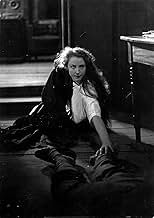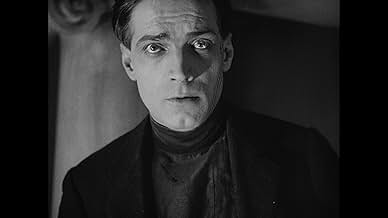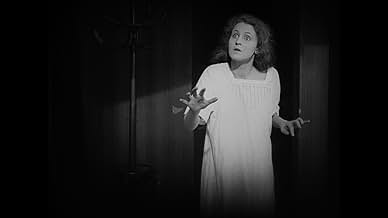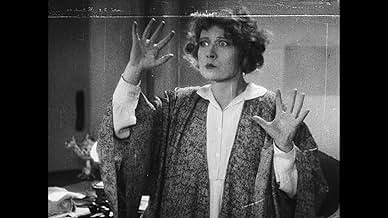Adicionar um enredo no seu idiomaIn the Crimea, the Reds and the Whites aren't done fighting, and Jeanne discovers that the man she loves is a Bolshevik (when he kills her father). Penniless, she returns to Paris where she ... Ler tudoIn the Crimea, the Reds and the Whites aren't done fighting, and Jeanne discovers that the man she loves is a Bolshevik (when he kills her father). Penniless, she returns to Paris where she works for her uncle. Soon after, her lover Andreas is in France to organize the sailors in... Ler tudoIn the Crimea, the Reds and the Whites aren't done fighting, and Jeanne discovers that the man she loves is a Bolshevik (when he kills her father). Penniless, she returns to Paris where she works for her uncle. Soon after, her lover Andreas is in France to organize the sailors in Toulon. So also is a thief, traitor, and libertine, Khalibiev, who wants to seduce Jeanne... Ler tudo
- Direção
- Roteiristas
- Artistas
- Hotel Maid
- (as Küpfer)
- Chief of Police
- (as Scholz)
- Direção
- Roteiristas
- Elenco e equipe completos
- Produção, bilheteria e muito mais no IMDbPro
Avaliações em destaque
It is after the revolution Jeanne and her father record the events. Looks like her father is on the losing side when the Red Army arrives. He is dispatched and she is sent to Paris. That is where the story of the revolution ends and a good old-fashioned mystery begins, from the loss of a diamond to even possibly murder.
I always knew that the movie was a classic but other than G. W. Pabst (I have quite a few of his films); I just realized that this was from a novel by Ilja Ehrenburg. Looks like I have some reading to do. And I was surprised to see Brigitte Helm (Metropolis - The Creative Man/The Machine Man/Death/The Seven Deadly Sins/Maria). This film has many facets.
The film begins during the Russian Revolution. Jeanne and her father are there on some sort of diplomatic-type mission and her father laments that the years spent in the country have been a waste of time. At this point, you see Jeanne thinking about her experiences--falling in love with a Communist and her championing of the Bolshevik revolution. This is the sort of plot, by the way, that NEVER would have been allowed just a few years later during the Nazi years--no way would such a film ever see the light of day because it is pro-Communist.
An evil schemer, Khalibiev, has created a list of supposed Communinists and sold it to Mr. Ney. Jeanne's lover comes to Ney to demand the list and in the process he kills his lover's father. Jeanne comes in to see this happen and soon flees to Paris to stay with an uncle. However, and this makes no sense at all, she STILL is in love with her Bolshevik boyfriend--even though she knows he murdered her father--who she supposedly loved!! Who writes this sort of stuff?! Once in Paris, Jeanne is lusted after by her nasty Uncle--who happens to be a private detective. At the same time, her blind cousin is courted by Khalibiev--who ALSO lusts after Jeanne!! Eventually the Uncle is killed by Khalibiev (it's a long story) and Jeanne's Communist lover (who just happens to be in Paris as well--it's odd how NONE of the Russians in the film seem to stay in Russia!!) is implicated. So, it's up to the plucky Jeanne to save the day.
Very little of this movie seems plausible. Mostly it's because of Jeanne's unwillingness to bear some sort of grudge for the murder of her father, but there is still more that makes no sense. Khalibiev is a scoundrel but is so unsubtle and obvious you wonder why it took anyone more than a fraction of a second to suspect him! And as for the blind girl, she needed acting lessons and Pabst did nothing to stop this overacting. Get this....in her own home where she has lived for years, the lady gropes around like she's never been there before AND she never looks towards people when they talk. Had Pabst or this bad actress spent more than a minute or two with a blind person, then they would have realized this was all wrong. Yes, I expect that by 1927 the films had become sophisticated enough that they should have gotten this right.
Overall, the film is a silly trifle and not much more. For a better German silent film, try something by Fritz Lang or F.W. Murnau...or a good film by G. W. Pabst, such as "Die Freudlose Gasse" or "Tagebuch Einer Verlorenen". Or, see and here Pabst's brilliant sound film "Westfront 1918", for that matter.
The romantic account of "The Love of Jeanne Ney" goes from Ukraine to France, following the daughter of a French diplomat who is in love with a Bolshevik. The couple reunites in Paris after several vicissitudes. The characters include Jeanne's uncle, owner of a research firm, his blind daughter (Brigitte Helm, the Maria of "Metropolis"), a North American millionaire who has lost an invaluable diamond, and a Russian informer who sells to the highest bidder. There are moments of great visual force, as the scene in which the blind girl discovers the corpse of her father and the initial scenes of the Russian revolution.
However, the reason that motivates me to write about the film is, above all, extraordinary actor Fritz Rasp (1891-1976), as the ruthless snitch, fearsome as none. Rasp is an icon of the Teutonic villain: from the first time I saw him as the overwhelming "Thin Man" in Lang's "Metropolis," serving the owner of the city, every time I see him in another film, his characters are not to be trusted and his presence is intimidating: as the colonel in "Spies" and as "The Man" in "The Woman in the Moon", both by Lang, or as the Jew J. J. Peachum, "King of the Beggars", in Pabst's "The 3-Penny Opera". In "The Love of Jeanne Ney" Rasp builds the disgusting character of Khalibiev, an informant who fingers the Bolsheviks in Ukraine, and in Paris not only does he stalk Jeanne and her lover, but uses Jeanne's young blind cousin to concrete his evil plans.
As Pabst, Rasp also continued working during the Nazi period, although not acting with the frequency of the past. He had a long career, that included playing the lead in a film of the "new cinema" of West Germany, "Lina Braake" (1975), which was his last appearance in cinema.
Você sabia?
- CuriosidadesMilly Mathis's debut.
- Versões alternativasTwo different edits of the film exist. The A Negative, for the American market (86 mins) and the B negative, for the German market (105 mins). The two versions feature different camera angles and some cuts were made for the American market.
Principais escolhas
Detalhes
- Tempo de duração
- 1 h 44 min(104 min)
- Mixagem de som
- Proporção
- 1.33 : 1























